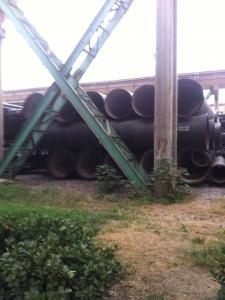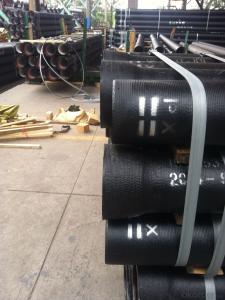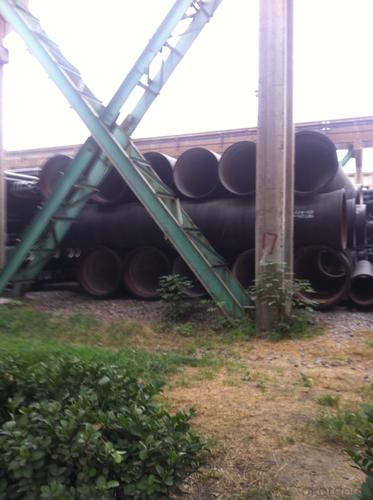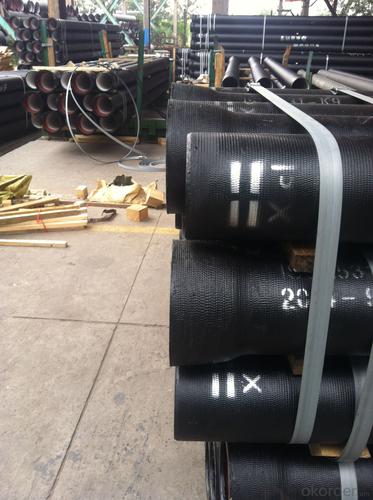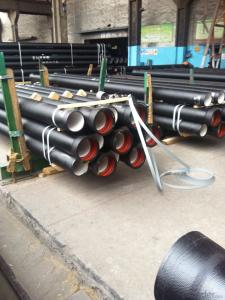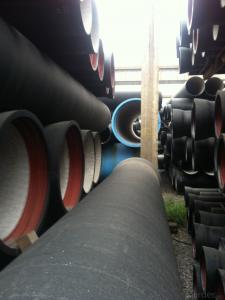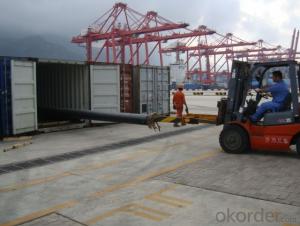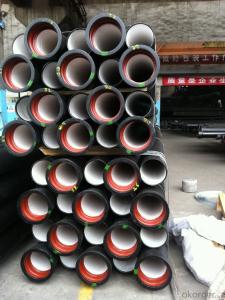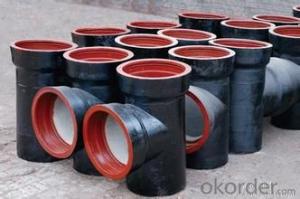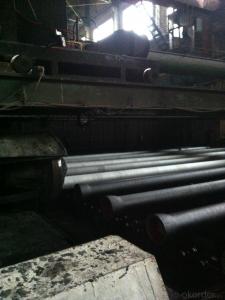DUCTILE IRON PIPE AND PIPE FITTINGS K9 CLASS DN200
- Loading Port:
- Tianjin
- Payment Terms:
- TT OR LC
- Min Order Qty:
- 20 pc
- Supply Capability:
- 3000 pc/month
OKorder Service Pledge
OKorder Financial Service
You Might Also Like
Material : Ductile Cast Iron
Size Range : DN 80mm to DN 2000mm
Unit Effective Length : 6m or 5.7m
Manufacture Standard: ISO 2531:1998/ EN 545:2006/EN 598:2007
Annual capacity : 200,000 tons
Coating Exterior: Zinc 130g/m2 according to ISO 8179-1 and bitumen coating 70 microns.
Cement Interior: Portland Cement/ High Alumina Cement/ Sulphate Resisting Cement Lining according to ISO 4179
Special requirements on external coating and internal lining can be applied
We also provide accessories such as SBR/EPDM rubber gaskets, lubricant paste, pipe caps, PE sleeves, etc.
Additional Parts:
Each pipe is strictly inspected according to related standard to ensure permanently high performance.
Easy Installation at site and service free for life
Long Service Lifespan
Quotation will arrive you within 24hours once we get your inquiry.
We guarantee offering you a competitive price.
A copy of original inspection reports of pipes will be offered after shipment.
Photos of loading process will be sent to the customer after shipment effect.
We will follow-up the delivery progress after shipment effect and update to the customer on weekly basis.
- Q: How do ductile iron pipes perform in sandy soil conditions?
- Ductile iron pipes perform well in sandy soil conditions due to their inherent strength and durability. The material's high tensile strength allows it to withstand the pressure exerted by the surrounding soil, preventing pipe deformation and breakage. Additionally, the corrosion resistance of ductile iron ensures a longer lifespan, even in corrosive sandy soil environments.
- Q: Can ductile iron pipes be used for industrial applications?
- Yes, ductile iron pipes can be used for industrial applications. Ductile iron pipes offer excellent strength and durability, making them suitable for various industrial sectors such as water and wastewater treatment plants, chemical processing facilities, and power plants. They can withstand high-pressure conditions, resist corrosion, and have superior impact resistance, making them an ideal choice for industrial applications.
- Q: What effect does magnesium play in nodular cast iron?
- The role of magnesium as spheroidizing agent used in iron spheroidizing treatment, promote water ink is made of iron, carbon in liquid iron spherical graphite precipitation.
- Q: What is the typical wall thickness of ductile iron pipes?
- The wall thickness of ductile iron pipes can vary depending on their size and intended use, with a typical range of 0.25 inches (6.35 mm) to 0.5 inches (12.7 mm). However, when dealing with larger diameter pipes or those meant for high-pressure applications, the wall thickness may exceed these measurements. To determine the suitable wall thickness for a ductile iron pipe, it is crucial to refer to industry standards and project specifications.
- Q: Do rigid cement cast iron pipes need cement piers?
- Ductile weakness: ductile cast iron pipes connected by human factors such as the operation level of responsibility, influence, construction not convenient. The advantages of PE PE PE pipe has good corrosion resistance and its anti inorganic performance than that of the metal pipe is much stronger in the buried without corrosion, construction convenient. Small diameter PE pipe in the price performance ratio is better than that of steel and ductile iron.PE tube have disadvantages: benzene, gasoline, carbon tetrachloride and other organic solvents have certain effect on pe. If the organic solvent is infiltrated into the polyethylene, the swelling will occur, and its physical properties will be decreased. Its pressure resistance and temperature resistance are poor.
- Q: How can the three pipes of ductile iron leak?
- When the pipe connection of the three water leakage, first of all to see whether it is to do the pipe three links of the manufacturers, pressure did not reach, if it is. It is only the replacement, if not, with cast iron electrode welding, or socket connection half!
- Q: What is the difference between flexible joint mechanism and seismic cast iron pipe DN100 and ductile iron pipe?
- Nodular cast iron has high strength and strong plasticity. The tensile strength of ductile iron is twice that of gray iron, and the yield strength even exceeds that of cast steel.
- Q: What does "K8" mean in ductile iron pipe grades?
- K9 is GB, K10 is specially customized, K8... Strictly speaking, it is not up to standard, standard length, wall thickness and so on.. Many workshops, grades of factory products, such as K9, standard length 6.15M, K8 is 6M, wall thickness from the beginning of DN100, are thin on the point.
- Q: Can ductile iron pipes be used in coastal or marine environments?
- Yes, ductile iron pipes can be used in coastal or marine environments. Ductile iron is a type of cast iron that has been treated with magnesium to give it enhanced strength, ductility, and resistance to corrosion. This makes it suitable for use in environments with high levels of moisture, such as coastal or marine areas. Coastal and marine environments are known for their high levels of saltwater, which can cause corrosion in metal pipes. However, ductile iron pipes have excellent corrosion resistance due to their protective coating. This coating acts as a barrier between the pipe and the corrosive elements present in saltwater, preventing the formation of rust and extending the lifespan of the pipes. Furthermore, ductile iron pipes can withstand the high pressures and stresses associated with coastal and marine applications. They have a high tensile strength, allowing them to handle the weight of soil, rocks, and other materials that may be present in these environments. Additionally, ductile iron pipes are resistant to damage from external forces, such as waves or debris, making them a reliable choice for coastal or marine projects. In summary, ductile iron pipes are a suitable choice for coastal or marine environments due to their corrosion resistance, high tensile strength, and durability. They can reliably transport water or other fluids in these challenging environments while maintaining their structural integrity over an extended period of time.
- Q: How are ductile iron pipes connected together?
- Ductile iron pipes are typically connected together using a jointing method called push-on joint. This involves lubricating the spigot end of one pipe and inserting it into the bell end of another pipe. The two pipes are then pushed together until the spigot end reaches the center of the bell end, creating a tight and secure connection.
Send your message to us
DUCTILE IRON PIPE AND PIPE FITTINGS K9 CLASS DN200
- Loading Port:
- Tianjin
- Payment Terms:
- TT OR LC
- Min Order Qty:
- 20 pc
- Supply Capability:
- 3000 pc/month
OKorder Service Pledge
OKorder Financial Service
Similar products
Hot products
Hot Searches
Related keywords
